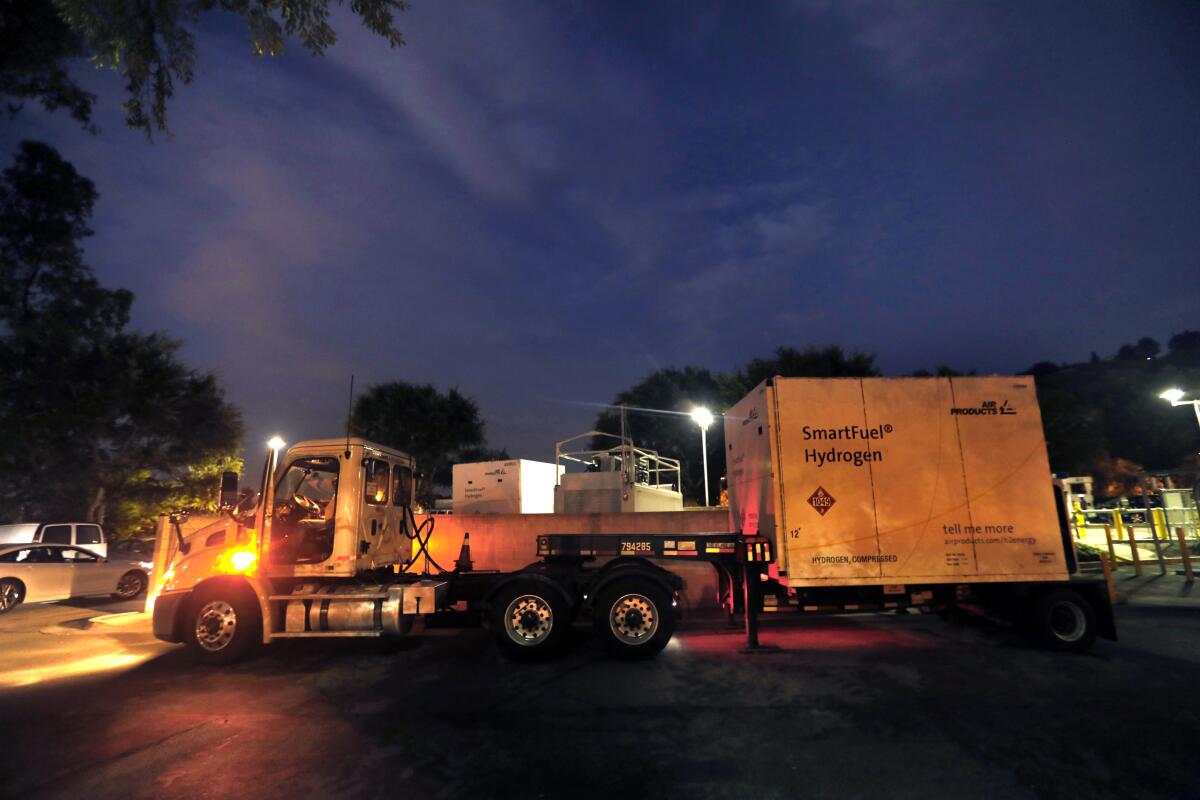Hydrogen isn’t clean if it adds to climate pollution. Biden’s rules are a good start

- Share via
The Inflation Reduction Act, signed by President Biden more than a year ago, is a game-changing law that invests hundreds of billions of dollars to fight climate change and boost renewable energy.
It includes lucrative tax credits aimed at making it cheaper to produce clean hydrogen, which are expected to funnel more than $100 billion in taxpayer funds toward this nascent technology. As a fuel that releases only water vapor when burned, hydrogen is a promising tool to slash emissions from industries that will be harder to clean up through electrification, such as steel, cement, aviation and long-distance trucking.
The Inflation Reduction Act is the biggest investment in climate action in U.S. history, but it pales in comparison to the scale of action needed to keep global warming from reaching disastrous levels.
But the climate benefits of hydrogen evaporate if they are made with fossil fuels. That’s why it’s important that federal officials ensure the most valuable incentives only support truly “green” hydrogen projects that do not add to carbon emissions. And it’s why it was something of a relief to see the Biden administration release unexpectedly stringent rules last month requiring that hydrogen projects meet rigorous life-cycle emissions standards to qualify for the most generous tax credits.
It’s much cheaper to produce hydrogen with methane, a highly polluting fossil fuel, than with electricity. These subsidies are designed to upend those economics by making hydrogen produced with renewable energy cost-competitive.
State regulators gutted the incentive programs for rooftop solar earlier this year. And now, as feared, the solar industry is contracting. This is the opposite of what we need to fight climate change.
Clean hydrogen is produced by splitting water molecules using massive amounts of electricity. These power-hungry projects can hog clean energy from other users and actually drive up consumption of fossil fuels.
To avoid this, environmentalists pushed to have hydrogen projects meet strict requirements to be eligible for the most generous tax credits of $3 per kilogram of “clean” hydrogen — including being powered by additional sources of zero-emissions electricity, such as wind and solar; being generated at the same time of day as the water-splitting equipment is operating; and being deliverable within the same region where the hydrogen is produced.
Finally, the world agrees to move away from fossil fuels, adopting a historic agreement at the COP28 summit in Dubai. Doing it is another thing.
The Treasury Department standards released last month largely adhere to these principles, to the delight of environmentalists and the consternation of business groups, which pushed for laxer requirements, and fossil-fuel-friendly politicians like West Virginia Sen. Joe Manchin III. There are details yet to be worked out, but federal officials are on the right track.
California has much at stake because the Biden administration selected the state as one of seven regional “clean hydrogen hubs’’ across the country that will receive $7 billion in federal infrastructure funding. So it’s disappointing that the Alliance for Renewable Clean Hydrogen Energy Systems, the state-led public-private consortium behind California’s hydrogen hub plan, was among the groups advocating against the tighter standards on the grounds that they would be too onerous and put clean hydrogen at a disadvantage compared with other technologies.
Editorial: Funding for California’s bullet trains puts the high-speed rail revolution back on track
The Biden administration’s $6-billion investment in high-speed rail lines in California and Nevada is a big step toward building a clean, fast rail network for the rest of the nation.
Being strict about what counts as green and clean is the right thing to do for the climate, as is reserving the greatest incentives to hydrogen production that actually reduces planet-warming emissions. Consumer advocates also have appropriately emphasized that such guidelines are needed to protect regular people from rising electricity rates that could result from hydrogen projects diverting power from existing renewable energy sources.
Clean hydrogen is still in its infancy, and state and federal leaders should monitor how these incentives are helping to grow a sustainable industry. We can’t afford to squander tens of billions of federal climate funding on projects with questionable environmental effects.
More to Read
A cure for the common opinion
Get thought-provoking perspectives with our weekly newsletter.
You may occasionally receive promotional content from the Los Angeles Times.













